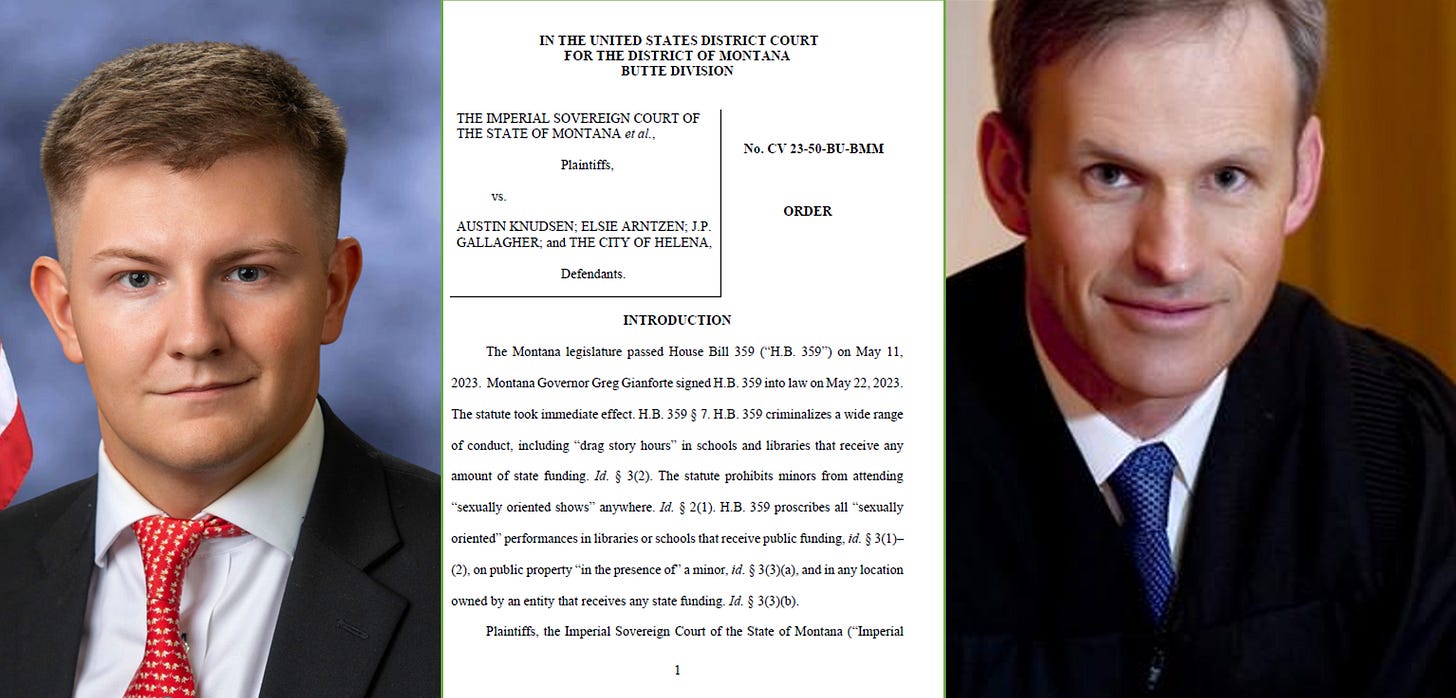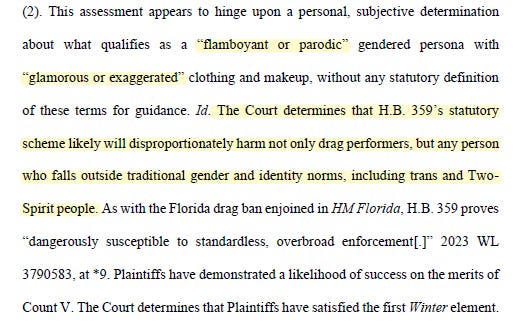Judge Blocks Montana Drag Ban Using Republican Rep. Braxton Mitchell's Own Words
A federal judge has issued a temporary restraining order on a Montana law banning drag in public. In doing so, he turned to Representative Braxton Mitchell's own words to make his ruling.
A federal judge, Judge Brian Morris, blocked Montana House Bill 359, known as Montana’s “Drag Ban,” late Friday afternoon. This bill, enacted into law on May 22, 2023, forbids anyone from performing in public while wearing "exaggerated makeup" and "adopting a flamboyant or parodic [male or female] persona with glamorous exaggerated costumes and makeup." The judge used the words of the bill’s author, Representative Braxton Mitchell, to determine that the legislation was unmistakably crafted with discriminatory intent, constituting an unconstitutional breach of freedom of speech and imposing content-based restrictions.
HB359 was established to outlaw "drag performances" in public areas, and to designate any venue hosting a drag show as a "sexually oriented business." Its sweeping language and extensive restrictions led to tremendous outcry, with critics arguing that it could impact theater productions, the transgender community, Pride events, and more. These concerns became a reality when a transgender individual was prevented from speaking at a library event discussing LGBTQ+ history. In another case, Helena city was stopped from issuing permits for one of Montana’s most significant Pride events. The judge referenced these specific impacts on Pride and the transgender community as reasons for blocking the legislation.
The opinion also invoked Rep. Braxton Mitchell’s own words to deduce that the bill was clearly drafted with discriminatory intent. In evaluating the bill's justification and argumentation, the judge determined that Rep. Mitchell's declared purpose for the bill was to hinder children from "adopting and accepting attitudes" regarding gender identity and to prevent children from "an inadequate understanding of gender roles." This is noteworthy, as the Constitution and court precedent prohibit the government from curbing the First Amendment rights of private citizens to promote a specific viewpoint — an action Rep. Mitchell clearly aimed to undertake with his legislation.
See the section of the judge’s opinion concerned with Representative Mitchell’s words:

In ruling that the law was unconstitutional, the judge evaluated it on a few different grounds. The first ground was on freedom of speech/first amendment protections. In several hearings against the bill, advocates pointed out that the bill fails to apply the Miller test for obscenity, rendering it unconstitutional. The Miller test specifies that speech can be considered obscene if it fills all of the following requirements:
Whether the average person applying contemporary community standards would find the work, taken as a whole, appeals to the prurient interest;
Whether the work depicts or describes, in a patently offensive way, sexual conduct specifically defined by the applicable state law; and
Whether the work, taken as a whole, lacks serious literary, artistic, political or scientific value.
The law, however, does not give any carveout for “patent offensiveness,” nor does it give any carveout for artistic, literary, political, or scientific value. These two factors led the judge to conclude that the law represents a clear violation of first amendment rights to freedom of expression, as seen here:
The judge also evaluated whether the law was overly vague and lacked narrow targeting to accomplish a state interest. The bill contains many terms with overly broad definitions that leave much room for interpretation. “Stripping” for instance could refer to taking off outer layers of clothing. It also defines drag as “adopting a flamboyant or parodic gendered persona with glamorous or exaggerated costumes or makeup.” The judge points out, as did many advocates against the bill during its hearings, that the language is overly broad in such a way that it could bar theatrical performances, transgender people, and anyone who is gender nonconforming. Ultimately, he determined that Montana’s drag ban is indeed overly vague and unconstitutional.
See here:
Interestingly enough, Representative Zooey Zephyr, a transgender representative in Montana who was silenced by Republican lawmakers and booted from the floor, had raised this exact point against the bill. When she did so, she was interrupted by the majority leader and told that she could not speak about the impact the bill would have on transgender people.
See this video:
Montana’s drag ban is now the third of its kind to be blocked in court. Earlier this year, both Tennessee and Florida saw their own drag bans enjoined as likely unconstitutional. This summer has provided a string of victories against anti-trans legislation in courts, with bans on gender-affirming care thwarted in four states, a sports ban overruled in West Virginia, and a groundbreaking ruling in Indiana stating that teachers do not have the right to deliberately misgender their transgender students.
Going ahead, the drag ban is set to undergo a full hearing where the case will be weighed on its merits. Yet, given the temporary restraining order, it seems the LGBTQ+ plaintiffs have every reason to have high hopes for victory. In the interim, Montana Pride organizers in Helena are pushing ahead with arrangements for one of the state's largest pride celebrations, much to the celebration of LGBTQ+ residents in the state.
Disclosures:
The author of this news article is engaged to Representative Zooey Zephyr.
The author of this article proudly testified against this bill:






It is a strange sort of schadenfreude when the erasure of Two-Spirit persons is used as a lever to potentially overturn anti-trans legislation (I’m partly Cherokee). Thanks Erin. 💕
This is excellent news! Thank you!